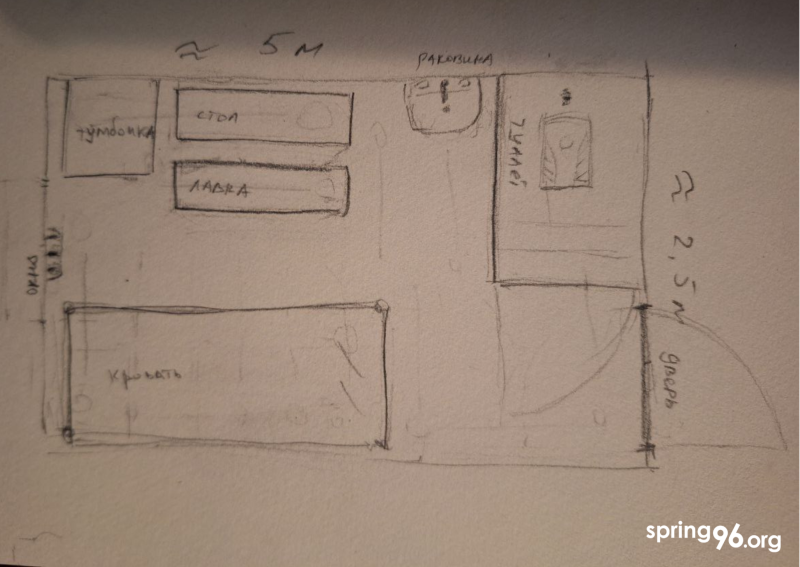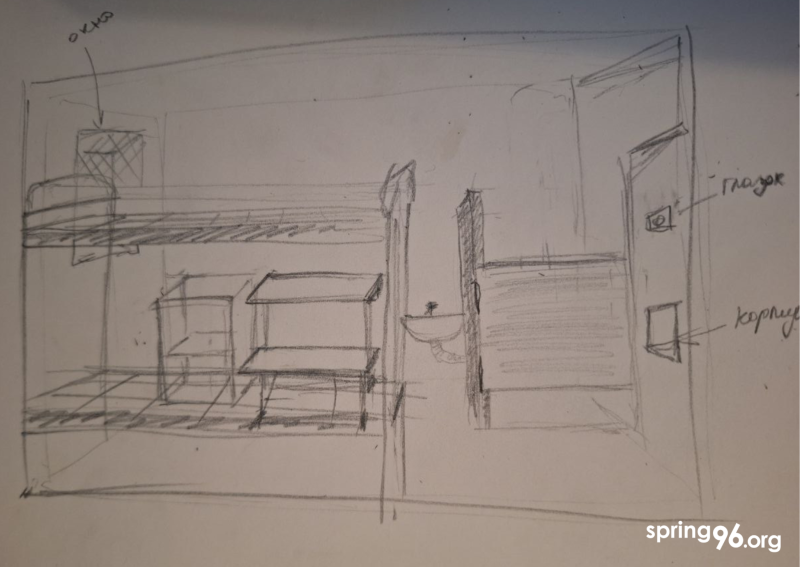"One girl fainted after an injection right in the hallway": what is happening at Akrescina?
Political repression in Belarus have not stopped for more than four years. Every day, security forces detain dozens of people across Belarus, and some of them are sentenced to several days of detention and held in inhuman conditions. Viasna spoke with a former prisoner who served her sentence at Akrescina a few weeks ago about her detention, the conditions in the infamous detention centre, the epidemic of rotavirus infection, and medical care.

- Cell image provided by Krystsina
"I read the report slowly, so they shouted at me, and I signed everything."
A few weeks ago, Krystsina (name changed for security reasons) was detained by KGB officers: two men in civilian clothes came to her workplace, three more in bandanas were waiting outside. As the woman later found out, the security forces then deleted the video from the surveillance cameras they had been filmed on.
The reason for Krystsina's detention was not given. The KGB interrogated her, then she was taken to the police department and was left there until morning.
"It was very cold there, but they left my jacket in the locker room and didn't give it to me. The cell was a dim, empty room with a concrete ledge, which I tried to sleep on.
A couple of hours later, the report was brought to me, but I was unable to understand what they wanted from me. I read slowly, so they just shouted at me, and I signed everything, but I didn't understand anything."
"I was sentenced to several days of detention while alcoholics who beat their wives and mothers were allowed to go home"
The police department drew up a report against Krystsina under Article 19.1 of the Administrative Code (petty hooliganism). This is one of the most common articles used by police officers against people detained for political reasons.
"They said that, out of hooligan motives, I was waving my arms, shouting, and using obscene language. I did not plea guilty, but I was sentenced to several days of detention while alcoholics who beat their wives and mothers were allowed to go home for a fine of 80 roubles (around 20 euros). I didn't understand what was going on. I also signed a document saying that I was explained that I can be held accountable for being in extremist chat rooms and so on."
"Two days have passed from the moment of my detention to the first meal in the Center for the Isolation of Offenders"
In the morning, the detainees were taken to wait for their trials, which were to take place via Skype. According to the woman, more than 20 people were convicted in about an hour and a half. After the trial, the prisoners, who were placed under administrative arrest, were transferred to the Center for the Isolation of Offenders at Akrescina.
"During the admission to the center, I was taken to a nurse. She wrote down my complaints and chronic illnesses. Then another girl and I were taken to a separate room, where an employee inspected us (we had to strip naked and squat); she behaved surprisingly politely, and then I was taken to a cell. It is worth noting that two days passed from the moment of my detention to the first meal in the center; all this time I ate no food and drank almost no water."
Krystsina, like all the political prisoners, got into the women's cell No. 15, with an area of about 2.5 by 5 meters.
"During my stay there were from 10 to 18 people. People went out and came in, but on average there were 15 people for most of the time. During the day, some were called for additional interrogations. The girls said that it was the KGB officers."
Because of overcrowding, detainees have to sleep not only on metal beds, which leave bruises, but also on the floor, under the table, on the table, and on the bench. Krystsina notes that those women who slept on the floor were bitten by bedbugs and their bodies were covered in red spots from the allergy to bites.
"The girls wore even shorts and tops"
For several years now, since 2020, the authorities have created special conditions for political prisoners in temporary detention centers: the cells are overcrowded, mattresses and bed linen are not provided, care packages from loved ones are accepted rarely, prisoners are not taken for walks and showers. Therefore, they have to wash in the sink or using a plastic bottle.
In addition, political prisoners are woken up at 2:00 and at 4:00 for a roll call. At the same time, the light in the cell is on 24/7.
"This is one of the main tortures. Bedtime started at 10. At 2:00 and at 4:00, they knocked on the door and everyone had to get on their feet, and the each had to say their last name, first name, and patronymic. After that, you could go to bed again. Getting up at 6 a.m. was also accompanied by a loud kick on the iron door."
According to Krystsina, during her detention, only a pair of underpants and socks, toilet paper, pads, tooth paste, a brush, and soap were transferred to the detainees.
"It was often stuffy in our cell, and the window was left ajar, but this did not help. Later, when the weather changed, it became very cold at night because of the open window. We didn't have warm clothes, as many were detained when it was still warm. The girls wore even shorts and tops. Those who were released left some of their clothes in the cell for those who needed them more and went out in T-shirts when they were sure that they would definitely be released and that their relatives would meet them."
Basically, the women were detained under two categories of articles: 19.1 of the Administrative Code (petty hooliganism) and 19.11 of the Administrative Code (distribution of extremist materials). According to the woman, those who were tried under the "extremist" article were released immediately, and those who were "hooligans" often had new report drawn up against them. All of Krystsina's cellmates were sentenced to 10–15 days of detention.
"They reacted skeptically to fainting"
If medical care is provided at Akrescina, it is of poor quality and untimely. The medical staff often ignores the complaints of prisoners, and medicines are not transferred from relatives. Krystsina told Viasna how the whole cell had a rotavirus infection:
"Some of the girls fainted. They had a fever. The guards reacted skeptically to fainting. The took away the prisoners for an injection of herbal supplements and threw them back in, pale and with blue lips. They were allowed to lie under the bed. Meanwhile, before the bedtime, no one can lie down, and sit with their eyes closed too. Otherwise, they can be punished by standing for a certain number of hours, depending on the 'offense,' according to the duty officer's discretion. One girl fainted after an injection right in the hallway. She was roughly picked up and thrown into the cell right into our hands. Fortunately we managed to catch her."
Daily routine in the Center for the Isolation of Offenders
"6:00 a.m. — wake up time. Around 7:00 they brought tea and bread. Later, some porridge: semolina, oatmeal, buckwheat, pearl barley, or something incomprehensible from a mixture of various cereals. But, overall, it is edible. Sometimes without salt, sometimes with.
From 8:00, a doctor made the rounds. One of them did not show the medicine and could even say that they didn't have something, although we knew that they did. Sometimes, if we were lucky, the relatives managed to transfer hematogen — it was the only sweet available to us. One of the doctors gave it to us, but the evil one did not.
After the doctor's visit, there was a daily inspection of the cell: we were taken out into the hallway facing the wall, hands on the wall (medicines, pills, nasal drops, inhalers — all had to be held in our hands and could not be left in the cell, otherwise they would be thrown away).

- Cell image provided by Krystsina
The officers would enter, empty everything from the bedside cabinets, tap the walls, and sometimes, for fun, scatter sanitary pads all over the cell. At this time, they were doing a roll call: they called the last name and we had to say the first name and patronymic (at this moment, when the cell opens, you need to stand with your hands behind your back). After the check, we were allowed to return.
At about 12:00, they brought brown bread and white bread: about one loaf for eight–ten people. There was enough bread. Often there was even some left.
For lunch they brought soup, and most often it was okay. They gave us dried fruit beverage or kissel to drink. After that, we washed the soup plate and they put the main course there — a side dish and a pork or chicken cutlet, and on Fridays even liver, and some vegetables. For dinner, they gave a cutlet with a side dish, too, but without drinks.
We drank water from the tap. It's chlorinated of course, but no one died. In general, the food was tolerable. From my experience, it is better than in hospitals."

















